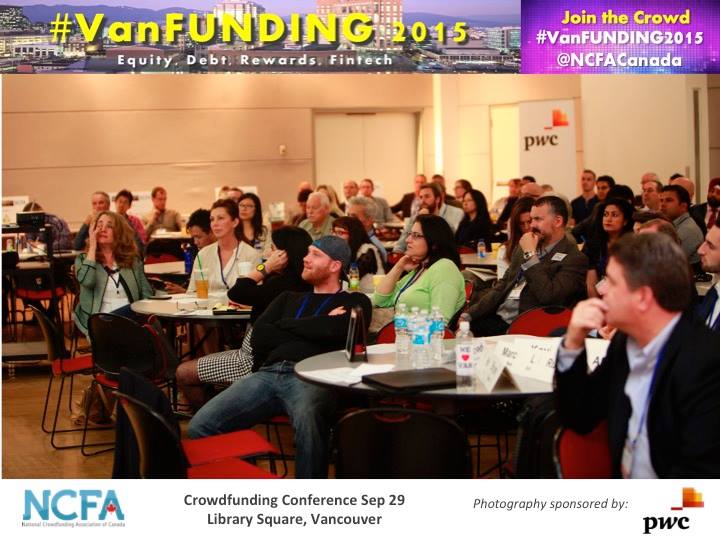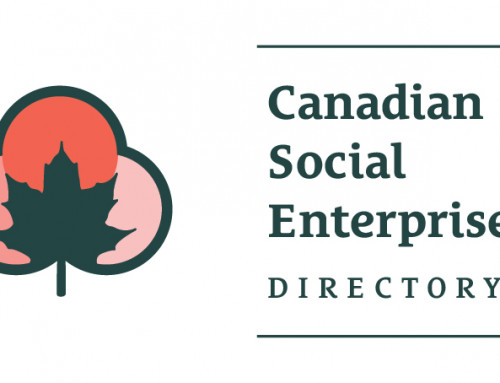Recently, I had the opportunity to attend the National Crowdfunding Association of Canada (NCFA’s) 2015 conference in Vancouver. I approached this event with an eye to learning how crowdfunding might be used by groups wishing to fund their social enterprise start-ups or growth plans.
For those new to the term, the NCFA defines crowdfunding as ‘the raising of funds through the collection of small contributions from the general public (known as the crowd) using the Internet and social media. Crowdfunding has its origins in the concept of crowdsourcing, which is the broader concept of an individual reaching a goal by receiving and leveraging small contributions from many parties.’
Cutting edge news, success stories, and advice was delivered through a series of TED Talk length presentations, coupled with panel sessions. I couldn’t help but feel the magic in the room, of being touched by the force of a nascent movement that is on the cusp of tipping into critical awareness.
Early on, a gentleman at the back of the room implored the presenters to ‘slow down’: this request was met with general laughter, and a later presenter telling the man to ‘buckle up’. This group has no intent of slowing down, and their rapid-fire delivery is, I think, evocative of the speed of the crowdfunding movement in general.
Although Canada is following on the heels of crowdfunding success south of the border, my sense is that our country is rapidly catching up, with BC alone now home to 23 crowdfunding portals and service providers (second only to Ontario, with 58).
Worldwide, $16.2B was transacted through crowdfunding in 2014, with $30B projected for 2015. Vancouver is cited as the ‘start-up hub’ for this newer form of capital attraction, growing from the earlier manifestations of donation- and reward-based crowdfunding (think Kickstarter and GoFundMe), now building to lending (repayable loans) and equity (share ownership) crowdfunding.
Here are some takeaways from the conference:
- Crowdfunding is a cross between Dragon’s Den and eTrade: ‘people working together using Internet technologies to solve a funding problem’.
- Angels are critical to business start-up financing, but there are only 2,000 of them in Canada: crowdfunding is another potential source of financing.
- Where more formal investment avenues tend to target the wealthy few, crowdfunding appeals to the ‘mass affluent’: a greater base of folks who may each have $2,000 to invest rather than $20,000.
- Successful crowdfunders can spend up to two years promoting their idea and building a base of support before launching a live campaign.
- Never launch a crowdfunding campaign at zero – this will deter first investors. Instead, secure some pledges before going live.
- On many crowdfunding platforms, if the funding goal is not reached, none of the funding transfers to the investee. Launch the campaign with a more modest target, and an internal goal to double it!
- Crowdfunding is a solid tool to use as real-world market research: if uptake from ‘the crowd’ is low, the offering can be modified in response.
- Some businesses are using crowdfunding in place of retail sales. An example was given of a knife that is sold directly via rewards-based crowdfunding, ‘cutting’ out the retailer, so to speak.
- Revenue-based crowdfunding is a form of loan crowdfunding that pays out investors based on a percentage of overall revenues of the (business) recipient.
- Equity (share sale) crowdfunding campaigns typically have only 90 days to close.
- Crowdfunding portals work with potential investees to build a strong crowdfunding offering out of the gate.
An interesting evolution of crowdfunding is evidenced in a new generation platform called ‘collaborative community payments’ or ‘CoCoPay’. For example, in the past, for donation-based campaigns such as an individual trying to raise funds for an expensive medical treatment, the funds go directly to the individual and if the goal is doubled, all of the money still flows to the person. In CoCoPay, the medical clinic is directly involved in managing the campaign, and receives the money directly. This ensures that the funds reach the stated endpoint, and any excess dollars raised might be directed to similar treatments for others in need.
In May of this year, the British Columbia Securities Commission released enabling crowdfunding legislation, which allows for start-up equity crowdfunding campaigns to raise up to $250K per offering, twice in a year, with an investor maximum of $1,500 per offering. Each offering must close within 90 days. This, without the need to issue the more involved prospectus (including financials) that is required of other securities offerings; and minus the requirement to meet the regular accredited investor rules.
For more information on crowdfunding in Canada, I recommend the NCFA website as your first stop.






